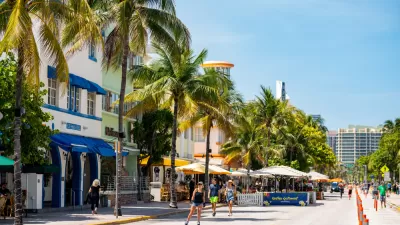Decades after preservationists helped usher in one of the country’s most successful urban revivals by protecting South Beach's Art Deco buildings, Miami Beach commissioners are considering whether to strengthen laws protecting residential properties.
The high-profile battle to prevent the demolition of a neo-Classical mansion, built by a prominent Miami architect in 1925, by a well-known couple has revived efforts to strengthen protections for the area's historic residential homes, reports Lizette Alvarez.
“We have reached a tipping point on Miami Beach where we are losing entirely too many pre-1942 single-family homes,” said William H. Cary, the assistant planning director for Miami Beach and the former preservation director for the New York City Landmarks Preservation Commission. “It appears it could begin to have a dramatic impact in changing the character of Miami Beach’s residential areas.”
"Tax incentives put in place in 2002 meant to encourage homeowners to ask for historic designation and preserve their houses are no longer working," says Alvarez. "That is because, in recent years, Miami Beach has drawn increasingly wealthy owners who are building increasingly large houses. The recession did not slow the pace of these renovations."
“Now, you have so many people coming in with so much money, they are saying we don’t need to be bothered with that,” said Jeff Donnelly, the public historian for the Miami Design Preservation League. “Incentives are not working anymore. We are not saying that every single property should be designated historic, but there should be a public process to determine it.”
"With the pressure on, Miami Beach commissioners are expected to consider whether to strengthen historic preservation laws and allow residential historic districts. First, though, the community must weigh in. A similar effort begun a decade ago foundered under the hefty opposition of developers, real estate brokers and some residents."
FULL STORY: Demolition Plans Reignite Preservation Issue in Miami Beach

Planetizen Federal Action Tracker
A weekly monitor of how Trump’s orders and actions are impacting planners and planning in America.

Congressman Proposes Bill to Rename DC Metro “Trump Train”
The Make Autorail Great Again Act would withhold federal funding to the system until the Washington Metropolitan Area Transit Authority (WMATA), rebrands as the Washington Metropolitan Authority for Greater Access (WMAGA).

The Simple Legislative Tool Transforming Vacant Downtowns
In California, Michigan and Georgia, an easy win is bringing dollars — and delight — back to city centers.

The States Losing Rural Delivery Rooms at an Alarming Pace
In some states, as few as 9% of rural hospitals still deliver babies. As a result, rising pre-term births, no adequate pre-term care and "harrowing" close calls are a growing reality.

The Small South Asian Republic Going all in on EVs
Thanks to one simple policy change less than five years ago, 65% of new cars in this Himalayan country are now electric.

DC Backpedals on Bike Lane Protection, Swaps Barriers for Paint
Citing aesthetic concerns, the city is removing the concrete barriers and flexposts that once separated Arizona Avenue cyclists from motor vehicles.
Urban Design for Planners 1: Software Tools
This six-course series explores essential urban design concepts using open source software and equips planners with the tools they need to participate fully in the urban design process.
Planning for Universal Design
Learn the tools for implementing Universal Design in planning regulations.
Smith Gee Studio
City of Charlotte
City of Camden Redevelopment Agency
City of Astoria
Transportation Research & Education Center (TREC) at Portland State University
US High Speed Rail Association
City of Camden Redevelopment Agency
Municipality of Princeton (NJ)





























